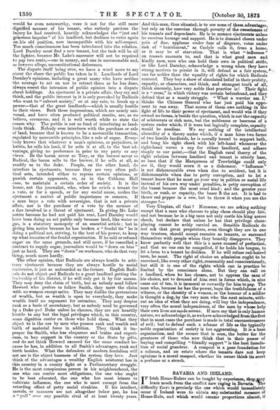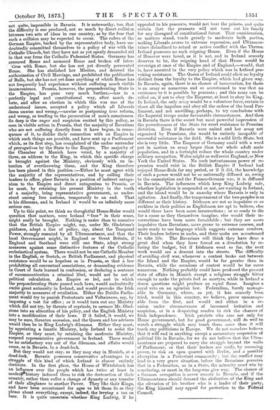BAVARIA AND IRIZAND.
IF Irish Home-Rulers can be taught by experience, theyluay learn much from the conflict now raging in Bavaria. ',The difficulty there is precisely the one which would immediately occur if Ireland were to obtain any substantial measure of Home-Rule, and which would assume proportions almost, it
not quite, impossible in Bavaria. It is noteworthy, too that the difficulty is one produced, not so much by direct collision between two sets of ideas in one country, as by the fear that such a collision may be expected to occur. The rulers of the German Empire, backed by the representative body, have un- doubtedly committed themselves to a policy of war with the Catholic Church, but they have not as yet openly demanded aid in that war from the Catholic Federated States. Germany has „censured Rome and menaced Rome and broken off inter-
lase with with Rome, but she has not yet directly persecuted Rome. She has abolished her Mission, and decreed the authorisation of Civil. Marriage, and prohibited the publication of Bulls, but she has not yet done anything of which Rome has not frequently had experience without suffering much visible inconvenience. Prussia, however, the preponderating State in the Empire, has gone very much further,—has in a perfectly legal and constitutional way, after much de- bate, and after an election in which this was one of the understood issues, accepted a policy which all Liberals deem unwise and wrong,--unwise as postponing true reform, and wrong, as tending to the persecution of men's consciences. So deep is the anger and suspicion excited by this policy, as seen in visible action in Prussia' that the majority of Bavarians who are not suffering directly from it have begun, in conse- quence of it, to dislike their connection with an Empire in which such things are possible, and have sent up a Parliament which, as its first step, has complained of the undue surrender of prerogatives by the State to the Empire. The majority of the Chamber at Munich have voted, by a majority of three, an address to the King, in which this specific charge is brought against the Ministry, obviously with an in- tention of overthrowing them, and the King therefore has been placed in this position :—Either he must agree with the majority of the representatives, and by calling their leaders to office place Bavaria in a position of indirect antago- nism to the Empire and direct antagonism to Prussia, or he must, by retaining his present Ministry in the teeth of a majority' bring representative government, as under- stood among free nations, temporarily to an end. That is his dilemma, and in Ireland it would be an infinitely more serious one.
Up to this point, we think no thoughtful Home-Ruler would question that matters, were Ireland "free" in their sense, might easily be brought. Nothing is easier than to conceive that the British Empire might, say, under Mr. Gladstone's guidance, adopt a line of policy, say, about the Temporal Power, strongly resented by all 11tramontanes, and that the local Government might, in England or Great Britain, if England and Scotland were still one State, adopt strong measures against some distinctive features of the Catholic ecclesiastical system. There would not be one Catholic Member in the English, Or Scotch, or British Parliament, and physical resistance would be as hopeless as in Prussia, so that a law prohibiting all conventual associations, or demanding evidence in Court of facts learned in confession, or declaring a sentence of excommunication a criminal libel, would not be out of political calculation. An Empire so led, and in which the preponderating State passed such laws, would undoubtedly excite great animosity in Ireland, and would provoke the Irish niajotity to measures of retaliation. Either the Dublin Parlia- ment drattkl try to punish Protestants and Voltaireans, say, by imposing a test fat office ; or it would barn out any Ministry which did not try, by threats of reprisals, to- menace Mr. Glad- stone into an alteration of his policy', and the English Ministry into a niodification of their laws. If it failed, it would, we may be sure, threaten secession, and the Queen and her advisers 'w'ould then be in King Lndwig's dilemma. Either they must, by appointing a fanatic Ministry, help Ireland to resist the Empire, or they must, by retaining the moderate Ministry, suspend representative government in Ireland. There would be no satisfactory way out of the dilemma, and affairs would come, as in Bavaria, to a dead-lock. But they would not stay, as they may stay in Munich, at a dead-lock. Bavaria possesses corraervative advantages in a struggle of this kind of which Ireland is almost entirely destitute. In the first place, the House of Wittelabach has an influence over the people which has twice at least in moderehistory induced them to risk the destruction of their countrir, rather than suffer a change of dynasty or any transfer of their allegiance to another Power. They like their Kings, and have been accustomed for ages to It them do as they please about everything, except, indeed, the levying a tax on beer. It is quite uncertain- whether King Ludwig, if he
appealed to his peasants, would not beat the priests, and quite certain that the peasants will- not turn out his family for any disregard of constitutional forms. That consideration, as matters stand, tends greatly to moderate both parties, making Liberals averse to extreme repression, and Miran:ion- taines disinclined to actual or active conflict with the Throne. Ireland possesses no such reigning House. Even if the House of Hanover were loved, as it is not, and in Ireland scarcely deserves to be, the reigning head of that House would be sovereign at once of the Empire and of England,—would, that is, have assented to the very policy which was in Ireland pro- voking resistance. The Queen of Ireland could elicit no loyalty distinct from the loyalty to the Empire, which had given way. In Bavaria, again, there is no chance of insurrection, for there is an army so numerous and so accustomed to war that no resistance to it is possible by peasants ; and this army can be relied on, if not to obey the Emperor, at least to obey its King. In Ireland, the only army would be a volunteer force' certain to share all the impulses and obey all the orders of the local Par- liament, and not unwilling, perhaps, to try conclusions with. the Imperial troops under favourable circumstances. And then in Bavaria there is the secret but most powerful impression of the powerlessness of the State for overt resistance to Prussian dictation. Even if Bavaria were united and her army not organised by Prussians, she would be entirely incapable of successful resistance in the field. She is a solid little State, but she is very little. The Emperor of Germany could with a word put in motion an army larger than her whole adult male population, and in a fortnight reduce the whole country tinder military occupation. Wales might as well resist England, or New York the United States. No such instantaneous power of re- pression would exist in the British Empire if Ireland had enjoyed Home-Rule for any period, or if it did, the knowledge of such a power would not be so universally diffused as, owing to the conscription and the Franco-German war, it is diffused in Bavaria. The influences which keep King Ludwig safe, whether legislation is suspended or not, are wanting in Ireland, and the island would be in anarchy where Bavaria is only in agitation. And finally, the temperament of the two peoples is as different as their history. Irishmen are not so impulsive or so reckless in their politics as Englishmen are apt to believe, else would there have been more insurrections ; or so ready to die for a cause as they themselves imagine, else would their in- surrections have been more formidable ; but they are more impulsive than Bavarians, more prone to extreme courses, and more ready to use language which suggests extreme resolves. Their leaders believe in mobs, and their mobs are accustomed to take life. The Bavarians will think they have done a great deal when they have forced on a dissolution by re- fusing the budget, but if Irishmen went so far, the next week would see a descent into the streets. The difficulty of avoiding civil war, whenever a contest broke out between the Island and the Empire, would be far greater than in Bavaria, while the occasions of contest would be far more numerous. Nothing probably could have produced the present state of affairs in Munich except a religions struggle bitter enough to make the priests feel as martyrs, while in Ireland a dozen questions might produce an equal flame. Imagine a royal veto on an agrarian law. Federalism, barely manage- able in Germany, where, as yet, it has scarcely been tried, would in this country, we believe, prove unmanage- able from the first, and would end either in a re- union under circumstances of increased irritation and suspicion, or in a despairing resolve to risk the chances of Irish independence. Irish patriots who care not only for Home government, but for good government, will do well te watch a struggle which may teach them more than it will teach any politicians in Europe. We do not ourselves believe that it will end in anything eXcept a momentary suspension of political life in Bavaria, for we do not believe that the Ultra- montanes are prepared to carry the struggle beyond the walls of Parliament, or that their leaders are ready, by assuming power, to risk an open quarrel with Berlin, and a possible absorption in a Protestant community ; but the conflict may lead to a very grave situation, before the Bavarians perceive that in a Federation, as in a State, the minority must win by convincing, or must in the long-run give way. The chance of a German occupation is never remote in Bavaria, and' if the Ultramontanes should demand the abdication of the King and the elevation of his brother who is a leader of their party, the King himself may appeal for protection to the Federal Council.



































 Previous page
Previous page